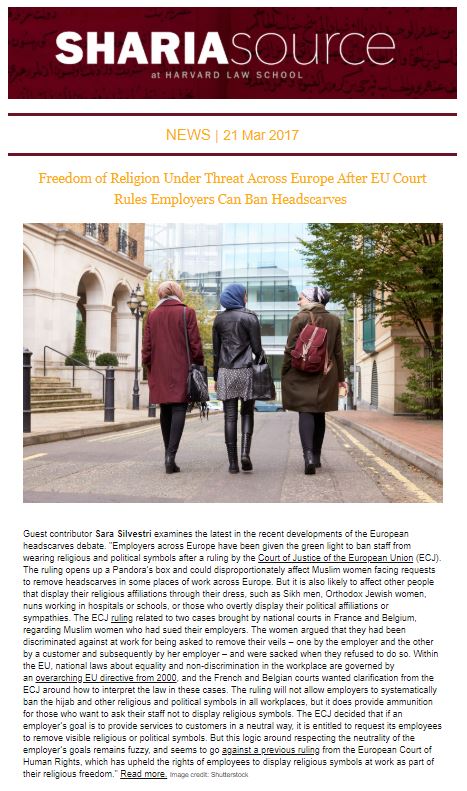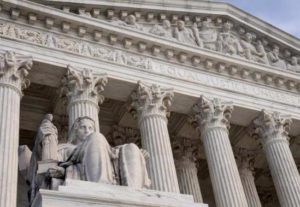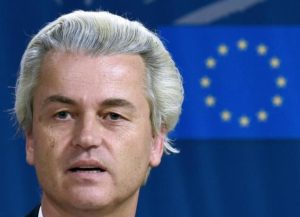
 Freedom of Religion Under Threat Across Europe After EU Court Rules Employers Can Ban Headscarves Guest contributor Sara Silvestri examines the latest in the recent developments of the European headscarves debate.”Employers across Europe have been given the green light to ban staff from wearing religious and political symbols after a ruling by the Court of Justice of the European Union (ECJ). The ruling opens up a Pandora’s box and could disproportionately affect Muslim women facing requests to remove headscarves in some places of work across Europe. But it is also likely to affect other people that display their religious affiliations through their dress, such as Sikh men, Orthodox Jewish women, nuns working in hospitals or schools, or those who overtly display their political affiliations or sympathies. The ECJ ruling related to two cases brought by national courts in France and Belgium, regarding Muslim women who had sued their employers. The women argued that they had been discriminated against at work for being asked to remove their veils – one by the employer and the other by a customer and subsequently by her employer – and were sacked when they refused to do so. Within the EU, national laws about equality and non-discrimination in the workplace are governed by an overarching EU directive from 2000, and the French and Belgian courts wanted clarification from the ECJ around how to interpret the law in these cases. The ruling will not allow employers to systematically ban the hijab and other religious and political symbols in all workplaces, but it does provide ammunition for those who want to ask their staff not to display religious symbols. The ECJ decided that if an employer’s goal is to provide services to customers in a neutral way, it is entitled to request its employees to remove visible religious or political symbols. But this logic around respecting the neutrality of the employer’s goals remains fuzzy, and seems to go against a previous ruling from the European Court of Human Rights, which has upheld the rights of employees to display religious symbols at work as part of their religious freedom.” Read more. Image credit: Shutterstock
Freedom of Religion Under Threat Across Europe After EU Court Rules Employers Can Ban Headscarves Guest contributor Sara Silvestri examines the latest in the recent developments of the European headscarves debate.”Employers across Europe have been given the green light to ban staff from wearing religious and political symbols after a ruling by the Court of Justice of the European Union (ECJ). The ruling opens up a Pandora’s box and could disproportionately affect Muslim women facing requests to remove headscarves in some places of work across Europe. But it is also likely to affect other people that display their religious affiliations through their dress, such as Sikh men, Orthodox Jewish women, nuns working in hospitals or schools, or those who overtly display their political affiliations or sympathies. The ECJ ruling related to two cases brought by national courts in France and Belgium, regarding Muslim women who had sued their employers. The women argued that they had been discriminated against at work for being asked to remove their veils – one by the employer and the other by a customer and subsequently by her employer – and were sacked when they refused to do so. Within the EU, national laws about equality and non-discrimination in the workplace are governed by an overarching EU directive from 2000, and the French and Belgian courts wanted clarification from the ECJ around how to interpret the law in these cases. The ruling will not allow employers to systematically ban the hijab and other religious and political symbols in all workplaces, but it does provide ammunition for those who want to ask their staff not to display religious symbols. The ECJ decided that if an employer’s goal is to provide services to customers in a neutral way, it is entitled to request its employees to remove visible religious or political symbols. But this logic around respecting the neutrality of the employer’s goals remains fuzzy, and seems to go against a previous ruling from the European Court of Human Rights, which has upheld the rights of employees to display religious symbols at work as part of their religious freedom.” Read more. Image credit: Shutterstock
 CASE: EEOC v. Abercrombie & Fitch, 575 U.S. __ (2015): “Ḥijāb Case” Facts: Respondent (Abercrombie) refused to hire Samantha Elauf, a practicing Muslim, because the headscarf that she wore pursuant to her religious obligations conflicted with Abercrombie’s employee dress policy. The Equal Employment Opportunity Commission (EEOC) filed suit on Elauf’s behalf, alleging a violation of Title VII of the Civil Rights Act of 1964, which, inter alia, prohibits a prospective employer from refusing to hire an applicant because of the applicant’s religious practice when the practice could be accommodated without undue hardship. Read the case. Image credit: J. Scott Applewhite | Star Tribune
CASE: EEOC v. Abercrombie & Fitch, 575 U.S. __ (2015): “Ḥijāb Case” Facts: Respondent (Abercrombie) refused to hire Samantha Elauf, a practicing Muslim, because the headscarf that she wore pursuant to her religious obligations conflicted with Abercrombie’s employee dress policy. The Equal Employment Opportunity Commission (EEOC) filed suit on Elauf’s behalf, alleging a violation of Title VII of the Civil Rights Act of 1964, which, inter alia, prohibits a prospective employer from refusing to hire an applicant because of the applicant’s religious practice when the practice could be accommodated without undue hardship. Read the case. Image credit: J. Scott Applewhite | Star Tribune
 The Ongoing Public Debate on Islam in the Netherlands Jan Jaap de Ruiter discusses the public debate on Islam and sharīʿa in the Netherlands shortly before the March 15th parliamentary elections. “The public debate on Islam and sharīʿa in the Netherlands is lively. A danger overshadowing this discussion is the polarizing rhetoric of populist parties. ” Read more. Image credit: Daily Mail
The Ongoing Public Debate on Islam in the Netherlands Jan Jaap de Ruiter discusses the public debate on Islam and sharīʿa in the Netherlands shortly before the March 15th parliamentary elections. “The public debate on Islam and sharīʿa in the Netherlands is lively. A danger overshadowing this discussion is the polarizing rhetoric of populist parties. ” Read more. Image credit: Daily Mail
See the full newsletter.

